In the quest for natural and supportive options for managing respiratory conditions, CBD (cannabinoid) has emerged as a topic of interest among those living with asthma and chronic obstructive pulmonary disease (COPD). With the growing acceptance of CBD products for various wellness applications, understanding its potential role in respiratory health becomes increasingly important.
Table of Contents
Understanding Asthma and COPD
The Search for Relief: CBD's Potential
CBD and Airway Relaxation
Incorporating CBD into Respiratory Health Management
Looking Ahead: The Future of CBD and Respiratory Health
Conclusion
Understanding Asthma and COPD
Asthma and Chronic Obstructive Pulmonary Disease (COPD) are two of the most common respiratory conditions, significantly impacting the quality of life for millions worldwide. While they share some symptoms and treatment strategies, they are distinct conditions with different underlying causes and disease processes.
Asthma
Asthma is a chronic inflammatory disorder of the airways, characterized by variable and recurring symptoms, reversible airflow obstruction, and bronchospasm. Episodes of wheezing, coughing, chest tightness, and shortness of breath mark its presence, which can vary in intensity from mild to life-threatening.
- Causes and Triggers: The exact cause of asthma is not fully understood but is thought to be a combination of genetic predisposition and environmental factors. Common triggers include allergens (such as pollen, dust mites, pet dander), respiratory infections, physical activity, cold air, smoke, and stress.
- Management: Managing asthma involves avoiding known triggers, using inhaler medications (both quick-relief and long-term control), and in some cases, allergy medications. Monitoring lung function and having an asthma action plan are also critical components of effective asthma management.
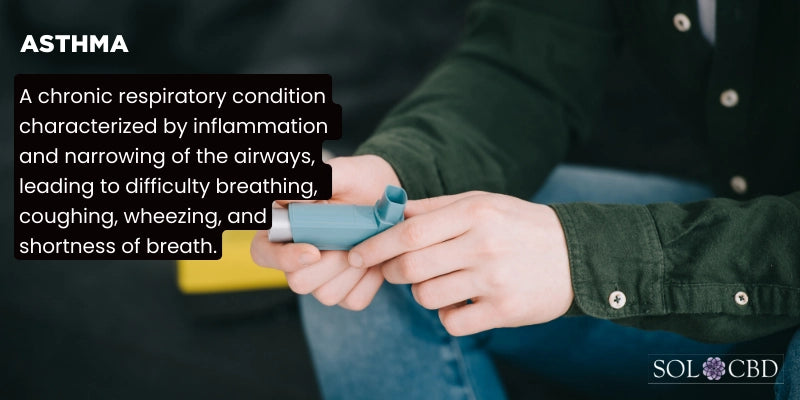
COPD
Chronic Obstructive Pulmonary Disease (COPD) encompasses a group of lung conditions, including emphysema and chronic bronchitis, that cause obstructed airflow from the lungs. It is a progressive disease, meaning it typically worsens over time.
- Causes: The primary cause of COPD is long-term exposure to irritating gases or particulate matter, most often from cigarette smoke. Smoking as well as vaping are said to put you at a significantly higher risk of developing COPD, although exposure to air pollution, dust, and chemicals can also contribute to the condition.
- COPD symptoms: Symptoms of COPD include chronic cough, increased mucus production, frequent respiratory infections, wheezing, shortness of breath, and fatigue. As the disease progresses, these symptoms can become more severe, significantly impacting daily activities and quality of life.
- Management: COPD management focuses on reducing exposure to risk factors (such as quitting smoking), using bronchodilator inhalers to ease symptoms, corticosteroids to reduce inflammation, and in some cases, oxygen therapy. Pulmonary rehabilitation and regular exercise can also help improve stamina and breathing.
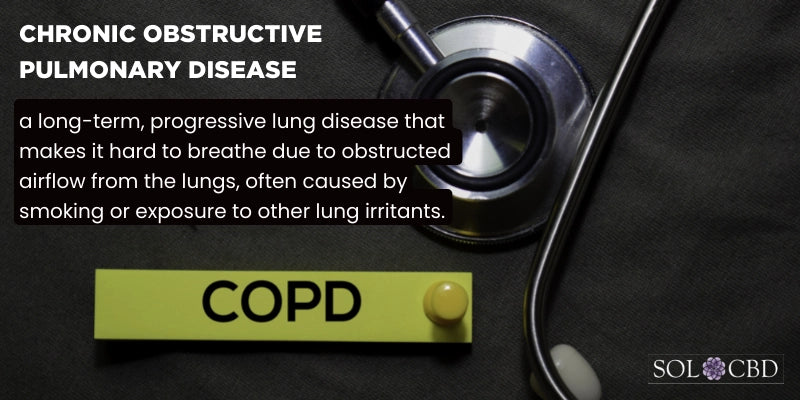
Both asthma and COPD can significantly affect individuals' lives, limiting their ability to perform daily activities, exercise, and even sleep comfortably. The emotional and psychological impact, including anxiety and depression, can also be significant, underscoring the importance of comprehensive medical care, support, and education for those living with these conditions.
Understanding the nuances of asthma and COPD is crucial for effective management and improving outcomes for those affected. With ongoing research and advancements in treatment, there is hope for better control of these conditions and improved quality of life for patients.

The Search for Relief: CBD's Potential
For individuals living with asthma and Chronic Obstructive Pulmonary Disease (COPD), finding effective ways to manage symptoms and improve quality of life is a constant journey. In recent years, Cannabidiol (CBD) derived from the cannabis plant, has emerged as a promising solution, thanks to its potent anti-inflammatory properties.
CBD's Role in Combating Inflammation
At the heart of asthma and COPD are inflammation and the narrowing of airways, leading to significant breathing challenges. CBD's potential to mitigate inflammation presents a novel avenue for relief:
- Anti-Inflammatory Mechanisms: CBD oil interacts with the body's endocannabinoid system (ECS), which plays a pivotal role in regulating inflammation. By modulating ECS activity, taking CBD could help reduce the production of inflammatory cytokines and mediate immune response, potentially decreasing airway inflammation.
- Evidence from Research: Several studies have begun to illuminate CBD's effects on inflammation. For instance, research in animal models has shown that CBD treatment can reduce airway inflammation in allergic asthma, suggesting a similar potential in human subjects. In the context of COPD, while direct research is more limited, the anti-inflammatory benefits of CBD may also support the management of chronic bronchitis symptoms, part of the COPD spectrum.

CBD and Airway Relaxation
Beyond its anti-inflammatory effects, CBD may also contribute to the relaxation of airway muscles, further easing the symptoms of asthma and COPD:
- Bronchodilation Properties: Preliminary studies suggest that CBD may have bronchodilatory effects, helping to open airways and improve airflow to the lungs. This could be particularly beneficial for asthma sufferers during an exacerbation, offering an additional tool for symptom management.
Potential Symptom Relief
By addressing both inflammation and airway constriction, CBD offers a dual approach to symptom relief in asthma and COPD:
- Easing Breathing Difficulties: With reduced inflammation and relaxed airway muscles, individuals may experience fewer episodes of wheezing, breathlessness, and tightness in the chest.
- Improving Overall Respiratory Function: While not a cure, integrating CBD into a comprehensive treatment plan may support better overall respiratory health and function, contributing to improved daily living and reduced symptom severity.
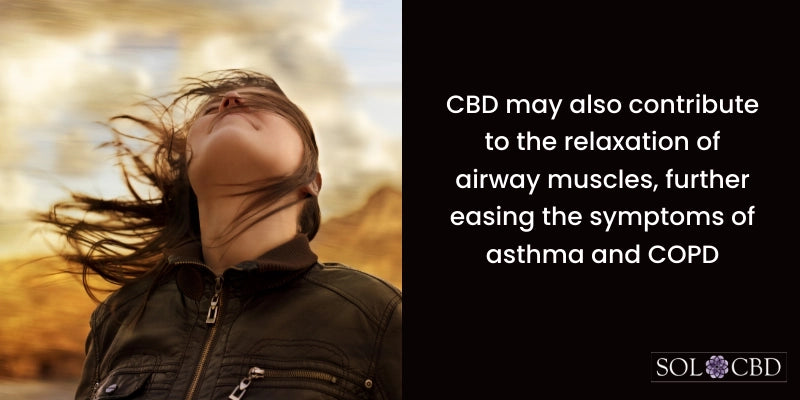
Incorporating CBD into Respiratory Health Management
For those considering adding CBD to their respiratory health regimen, this section offers guidance on how to use CBD safely. It emphasizes the importance of consulting with healthcare professionals and integrating CBD into an existing treatment plan, rather than replacing prescribed medications. The segment also covers the recommended starting dosages and the importance of monitoring symptoms closely when trying new supplements.
Consultation with Healthcare Professionals
- Seek Professional Advice: Before adding CBD or any new supplement to your treatment regimen, it’s crucial to consult with a healthcare provider. They can offer personalized advice based on your medical history, current medications, and overall health status.
- Discuss Potential Interactions: CBD can interact with certain medications by affecting how your body processes them, potentially altering their effects. A healthcare professional can help assess any risks and advise on a safe approach to incorporating CBD.

Integrating CBD with Existing Treatments
- Complementary, Not a Replacement: CBD should be viewed as a potential complementary therapy to your existing respiratory care plan, not a replacement for prescribed medications. Never discontinue or alter the dosage of your current medications without medical guidance.
- Collaborative Care Approach: Work closely with your healthcare provider to integrate CBD into your treatment plan effectively. This collaborative approach ensures that all aspects of your care are aligned and monitored for safety and efficacy.
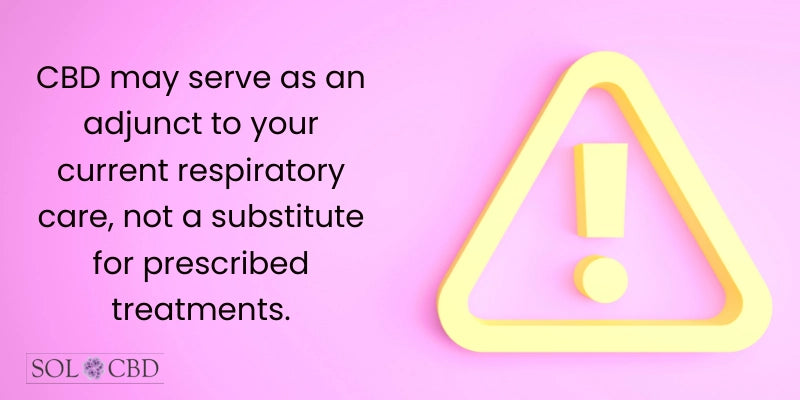
Starting Dosages and Monitoring
- Begin with Low Dosages: If you and your healthcare provider decide that CBD is a suitable option, start with a low dosage. This cautious approach allows you to gauge how your body responds to CBD and identify the minimal effective dose for symptom relief.
- Gradual Adjustments: Based on your initial response, you may gradually increase the dosage under the guidance of your healthcare provider. Incremental adjustments help find a balance that offers benefits while minimizing any potential side effects.
- Monitor Symptoms and Side Effects: Keeping a detailed diary of your CBD usage, dosage, and any changes in symptoms or side effects is invaluable. This record aids in tracking your progress and facilitates informed discussions with your healthcare provider about the impact of CBD on your respiratory health.
Quality Matters
- Choose High-Quality Products: Opt for high-quality, lab-tested CBD products from reputable sources. Products should be transparent about their CBD content, source of hemp, and testing for purity and contaminants.
- Selecting the Right Form: CBD is available in various forms, including oils, tinctures, capsules, and edibles. Consult with your healthcare provider to choose the form that best suits your needs and preferences, considering factors like ease of use and bioavailability.
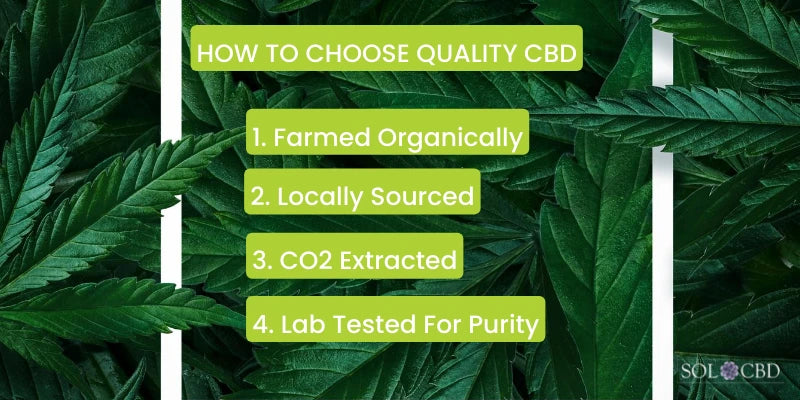
Incorporating CBD into your respiratory health regimen offers a novel approach to potentially alleviate symptoms and enhance well-being. However, the key to safely and effectively leveraging CBD's benefits lies in thorough consultation with healthcare professionals, careful integration into your existing treatment plan, and diligent monitoring of your response. By navigating CBD use with informed caution and professional guidance, individuals with respiratory conditions can explore this complementary therapy with confidence.
Looking Ahead: The Future of CBD and Respiratory Health
As interest in CBD's potential for respiratory health continues to grow, this final section looks forward to the future of research and what it might hold. It underscores the importance of ongoing studies to fully understand CBD's effects and its place in comprehensive treatment plans for asthma and COPD.
Conclusion
Exploring CBD's role in managing respiratory conditions like asthma and COPD reflects the broader interest in natural and supportive care options. With its potential anti-inflammatory and bronchodilatory effects, CBD offers a promising area of investigation for those seeking to enhance their respiratory health. However, it's crucial to proceed with informed caution, prioritizing safety, and integrating CBD into care plans under the guidance of healthcare professionals.
Interested in learning more about how CBD could support your respiratory health? Visit SOL CBD to explore our range of products and discover how they can be part of a balanced wellness routine.
Remember, a conversation with your healthcare provider is the first step towards safely incorporating CBD into your health regimen.
Sources
- https://www.ncbi.nlm.nih.gov/pmc/articles/PMC6943521/ - "Endocannabinoid System in the Airways"
- https://healthmatch.io/asthma/cbd-for-asthma - "CBD For Asthma: Does It Help?"
- https://www.healthline.com/health/cbd-and-asthma - "CBD and Asthma: Does It Work? What the Research Shows"
- https://floraflex.com/default/blog/post/cannabis-for-asthma-examining-its-potential-as-a-bronchodilator - "Cannabis for Asthma: Examining its Potential as a Bronchodilator"
- https://www.forbes.com/health/cbd/cbd-for-inflammation/ - "CBD For Inflammation: Does It Really Work?"




























